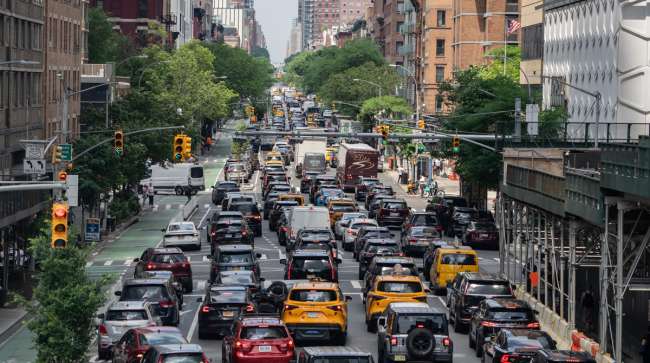Manhattan traffic before congestion pricing. (Jeenah Moon/Bloomberg News)
The Trump administration is threatening to stop future federal approvals for transportation projects in Manhattan and may withhold funding if New York City’s congestion pricing program continues.
The threat issued on April 21 comes after the Metropolitan Transportation Authority, which is implementing the new toll on motorists driving into parts of Manhattan, continued charging drivers after the U.S. Department of Transportation’s April 20 deadline to end the program.
In a letter to New York Gov. Kathy Hochul, Transportation Secretary Sean Duffy said that his department will stop giving authorizations on advance construction projects or National Environmental Policy Act approvals for plans within Manhattan, except for safety projects, unless the MTA ends congestion pricing by May 21.
“The federal government sends billions to New York — but we won’t foot the bill if Governor Hochul continues to implement an illegal toll to backfill the budget of New York’s failing transit system,” Duffy wrote. “We are giving New York one last chance to turn back or prove their actions are not illegal.”
The federal government sends billions to New York—but we won’t foot the bill if the state continues to implement an illegal toll to backfill the budget of New York’s failing transit system. https://t.co/cm3FxGIllb
— Secretary Sean Duffy (@SecDuffy) April 21, 2025
Spokespeople for Hochul and the MTA, which runs the city’s transit system, didn’t immediately respond to requests for comment.
The congestion pricing toll, the first of its kind in the U.S., began Jan. 5. Passenger cars with an E-ZPass pay $9 during peak hours to drive into Manhattan’s central business district, which runs from 60th Street to the bottom of the island.
The aim is to reduce traffic, improve air quality and raise $15 billion to extend the Second Avenue subway to Harlem, make more stations accessible and replace signals from the 1930s.
The fee, so far, has changed driving patterns. About 5.8 million fewer vehicles entered the tolled zone from January through March, according to MTA data. The MTA collected $100 million in the first two months of the program, and transit officials say it’s on track to generate $500 million this year, after expenses.






